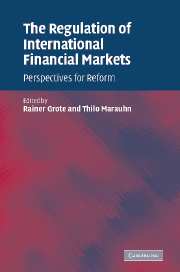Book contents
- Frontmatter
- Contents
- Notes on contributors
- Preface
- List of abbreviations
- Introduction: the regulatory dilemma in international financial relations
- PART I An historical perspective
- PART II A comparative perspective
- PART III A public international law perspective
- PART IV An institutional perspective
- PART V A policy perspective
- Conclusions and agenda for further research
- Index
Introduction: the regulatory dilemma in international financial relations
Published online by Cambridge University Press: 08 July 2009
- Frontmatter
- Contents
- Notes on contributors
- Preface
- List of abbreviations
- Introduction: the regulatory dilemma in international financial relations
- PART I An historical perspective
- PART II A comparative perspective
- PART III A public international law perspective
- PART IV An institutional perspective
- PART V A policy perspective
- Conclusions and agenda for further research
- Index
Summary
The globalisation of capital markets: benefits and risks
The globalisation of capital markets has become the subject of a broad public debate. It is no longer perceived as a purely technical topic. Its benefits and risks are part of a truly political discourse that has long left the secluded environment of the financial and academic elite. Benefits and risks of such globalisation are thus not only discussed from the perspective of economic rationality but are assessed against a whole set of heterogeneous values, such as democracy, human rights, and many more. While the debate has thus become much more vivid it is increasingly at risk to be governed by ideological motivations rather than rational arguments. Pleading for rationality does not mean to return to purely technical or even elitist considerations. Rather it aims at establishing a procedural framework to accommodate all the relevant aspects that should be taken into account by political, economic, and other decision-makers. Such procedural framework can effectively be provided by public international law arrangements. While this has been realised in other sectors of an increasingly global economy, capital markets have for one and another reason largely escaped the regulatory power of public international law. Even the academic discourse has long been led by economists and experts in private law with a significant silence on the side of political scientists as well as experts in public law. The situation seems about to change, most probably due to the topic moving into the wider political arena.
- Type
- Chapter
- Information
- The Regulation of International Financial MarketsPerspectives for Reform, pp. 1 - 24Publisher: Cambridge University PressPrint publication year: 2006
- 1
- Cited by



